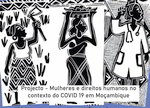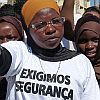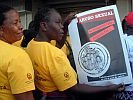When We Were Young Girls
Opinion
Valuarda Monjane1
When we were young girls, at a certain moment of our lives we always felt that for some reason we were not equal to our brothers and only slowly we started to understand why: because while men had been made to live in the world, women had been made to serve them and allow them a still more untroubled way of living.
However, what surprised me even more was not only this observation; what was more intriguing was how things had been constructed in such a perfect way to justify this male supremacy. When nowadays men and women say, “it has always been like that”, they actually refer to a very old relations game and therefore deeply rooted in our societies. At first sight it seems it has always existed and always will exist and we can do nothing more than to conform.
To conform! All female socialization has been based on 3 concepts: to serve, to be patient and to conform, that means, to recognise that women are physically weak and psychologically inferior beings and thus dependent on men who, contrary to them, are strong and complete beings.
This idea of a complete man reminds me that when I was a child I always found it strange that my younger brother had a penis and I didn’t, until finally somebody explained me that my penis had been amputated because I had been disobedient. Since then, I started to look at my brother with a lot of jealousy, as a complete, marvellous being, while I, who had always been more sensible than he, had been so coarsely punished. And that very ugly scar that at any time reminded me of how unworthy and incomplete I was!
To intensify this, during my adolescence I learned at catechesis that a woman was such an abject being that she had been the cause of the original sin. Eva had not only committed a sin and dragged Adam along with her, she had also brought sin to all humanity and her punishment and that of all women was to bleed every month and suffer until death. In this way a sinful woman was born and lived inside me, a cunning being who, if thinking in an autonomous way, would be able to cause the perdition of all humanity.
While our younger and older brothers were playing, we were required to perform first our female duties, duties that would make us perfect mothers and women, capable of fulfilling religiously the three concepts: to serve, to be patient and to conform.
In parallel, as we are growing up, we are bombarded with so many phenomena as if they would want to inform us constantly that in spite of so much struggle, a woman may do anything, but as long as she doesn’t have a household, a husband and several children to look after, she is still not a complete being (up to what point a human being may be naturally incomplete, evidently).
However intelligent we may be, we are still left out by our parents in going to school, getting a driving licence, enrolling in University, in an English course… It the money is only enough for one, it is evident that the boy will have privileges, irrespective of how better prepared the girl may be. For many parents, everything outside the domestic sphere is a loss of time and a deviation of the true vocation of girls: “if you were a boy, we would think about it, but in no time you will become pregnant, you will marry and it is my money that is tied up”.
For many parents, the girls don’t need to try hard to go a long way in life because they can do this easily through marriage. Thus it is natural that girls, rather than through study, apply themselves to tasks that make them “well-selling merchandise”: To seize a man through the stomach, to seize him in bed. Submission, the fulfilment of male wishes, is all seduction skills that allow them to succeed in getting a more or less stable marriage.
There is however a weapon of seduction still more powerful than these: the body, this malleable thing that needs to be continuously moulded until becoming according to male tastes, this thing of a woman who is a man’s property, and as such he may enjoy her as he sees fit. Thus, the format of our body, the worries about our diet, with the spare tyres around our middle, with the accumulated cellulite and fat, do not reflect a concern with our body but with a body we look after or should look after so that it may be better enjoyed by men.
But from time immemorial (even before the feminist collective struggles) there have always been women, and there still are, who even without having an idea of Women’s Rights, fight in an isolated way for a role different from being a housewife, different from being dependent on a man, women who ask themselves why they had to do so much and men so little. When a girl questions the fact that she has to do the household work, their mothers respond that she will have to treat well her husband; otherwise he will send her away.
While the role of the mothers is often decisive in the education of children, I am intrigued by the fact that precisely women are the greatest guardians of this patriarchal model that discriminates them. The mothers, who in general have more contacts with the children, are the greatest communicators of these values that may be expressed in phrases like: “Joana, don’t behave like a tomboy”, or also: “Fábio, don’t behave like a little girl”. All this is a discourse aimed at putting things in their places, maintaining the order of things. I imagine the profound dismay a boy feels when compared to a girl. It’s a horror!
It is obvious that it should be emphasized that both parents transmit values that were impressed upon them, they transmit them unconsciously, just as they learned them. However, human beings should question themselves, should question their deep-rooted ideas, because what we tell our children today will have consequences for the kind of men and women we want to/will have tomorrow.
The most important thing for feminists to do is to awaken to the fact that our struggle today for women gaining more space in society is not only through the awareness raising of men, but mainly the awareness-raising of other women.
- Research assistant, WLSA Mozambique.







 Information in English
Information in English



















